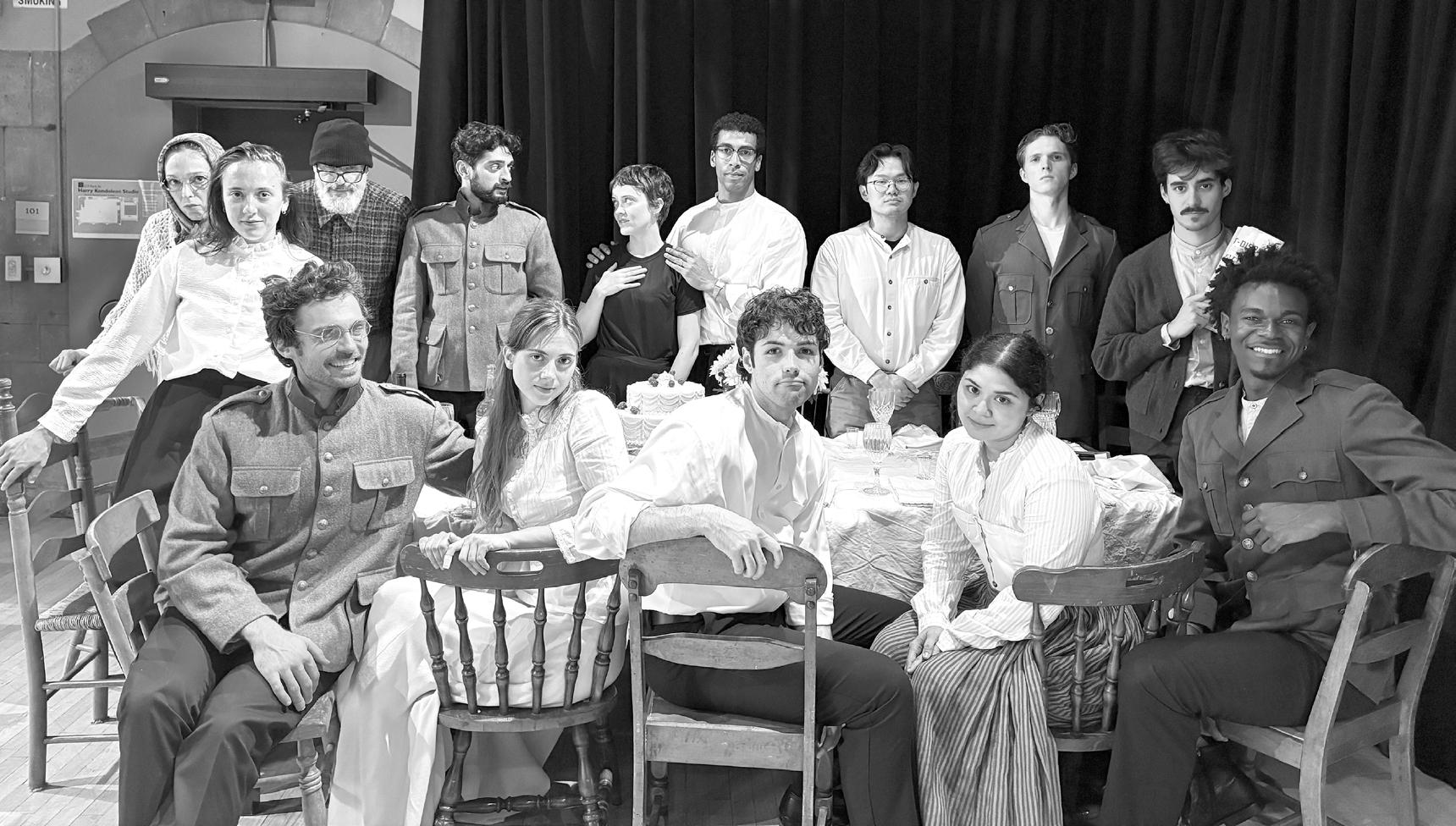




OCTOBER 2–4, 2025
DAVID GEFFEN SCHOOL OF DRAMA AT YALE
James Bundy, Elizabeth Parker Ware Dean Florie Seery, Associate Dean
Chantal Rodriguez, Associate Dean Carla L. Jackson, Assistant Dean Nancy Yao, Assistant Dean of Student Life
PRESENTS
By Anton Chekhov
Directed by Joan
MacIntosh
cast creative team
Production Dramaturg
Lara Priya Sachdeva
Fight and Intimacy
Director
Kelsey Rainwater
Stage Manager
Amanda Blitz
Vladimir Karlovich Róhde
Liam Beveridge
Irína Sergeyevna Prozorova
Dorottya Ilosvai
Andréi Sergeyevich Prozorov
Jack Kelley
Ivan Romanovich Chebutýkin
Francisco Morandi Zerpa
Aleksandr Ignatyevich Vershínin
Ameya Narkar
Vassily Vasilyevich Solyóny
Christopher Thomas Pow
Natásha Ivanovna Prozorov
Rebecca Rivera
setting Russia, 1900
Fyodor Ilyich Kulýgin
Darius Sakui
Baron Nikolaj Lvovich Túzenbach
Max Sheldon
Ólga Sergeyevna Prozorova
Emma Rosalyn Steiner
Alexei Petrovich Fedótik
Mark Yarde
Másha Sergeyevna Kulygina
Catherine Young
Ferapónt
Walton Wilson
Anfísa
Annelise Lawson
This production contains contains discussion of suicide and one offstage gunshot.
There will be a 15-minute intermission.
This production is supported by The Benjamin Mordecai III Production Fund.
artistic
Assistant Director
Annelise Lawson
Assistant Stage Managers
Jiawei Pei
Ángela Sofía Caro
Associate Production Manager
Md Fadzil “Fed” Hanafi Md Saad
Technical Supervisor
Mae Mironer
Associate Safety Advisors
Mara Bredovskis
Nat King Taylor
Run Crew
Tricie Bergmann
Walker Borba
administration
Associate Managing Director
Joy (Xiaoyue) Chen
Assistant Managing Director
Kay Nilest
Management Assistants
Kiara Rivera
Quinn O’Connor
House Manager
Maura Bozeman
Production Photographer
Maza Rey
David Geffen School of Drama productions are supported by the work of more than 200 faculty and staff members throughout the year.
We dedicate our work to the memory of our beloved colleague and friend, Malik James.
Yale acknowledges that indigenous peoples and nations, including Mohegan, Mashantucket Pequot, Eastern Pequot, Schaghticoke, Golden Hill Paugussett, Niantic, and the Quinnipiac and other Algonquian speaking peoples, have stewarded through generations the lands and waterways of what is now the state of Connecticut. We honor and respect the enduring relationship that exists between these peoples and nations and this land.
We also acknowledge the legacy of slavery in our region and the enslaved African people whose labor was exploited for generations to help establish the business of Yale University as well as the economy of Connecticut and the United States.
The Studio Projects are designed to be learning experiences that complement classroom work, providing a medium for students at David Geffen School of Drama at Yale to combine their individual talents and energies toward the staging of collaboratively created works. Your attendance meaningfully completes this process.
THE BENJAMIN MORDECAI III PRODUCTION FUND, established by Peggy Cowles ’65, honors the memory of the Tony Award-winning producer who served as Managing Director of Yale Repertory Theatre, 1982–1993, and as Associate Dean and Chair of the Theater Management Program from 1993 until his death in 2005.
“Act I should progress at the pace of arrival,” said Chekhov to director Konstantin Stanislavsky apropos of The Cherry Orchard, which itself “arrived” in Moscow in 1904—as did Three Sisters three years prior (though its eponyms did not). Act I of Three Sisters, too, contains an arrival (a commanding officer, no less). But, unlike in The Cherry Orchard, in this play it is the prospect of departure that sustains.
Chekhovian scholar Richard Gilman isn’t wrong when he writes that the “story” concerns the present, “the only real time granted to us…that confluence of what is no more and what is not yet.” But as the three sisters’ one brother reminds us most explicitly “the present is awful.” Easier, then to dream a little about the future. And so, the characters do.
“Going back to Moscow!” is a dream the sisters share, one that motions—forwards then backwards then forward again. And yet, to be “the thing that keeps [them] going,” the dream—and thus, the dreamers—must stay put. Whether it be for an arrival or a return, waiting “is an enchantment,” writes Barthes.
Just as the sisters find themselves unable to move, so, too, are we suspended. The saying a watched pot never boils might be amended in Chekhov to an expected cup of tea takes half an act to brew—enough
time to hold arrival, departure, conflict and confession. Action, for Chekhov, is largely an offstage affair; deaths, fires, and indeed, affairs, are things we must understand to happen as we sit in the meantime and agree to be enchanted.
Still time is not. With periodic reference to season or date, Chekhov reminds us of its passing while simultaneously rendering all attempts to keep it inadequate: “Your clock is seven minutes fast,” remarks Kulýgin, a clock being one of several things later destroyed in Act III; others include a camera and a musical instrument, themselves evoking attempts to see time captured (in the case of a photograph) or yoked (by means of rhythm).
As far as departures go, the play ends in several, though none is the one ostensibly promised. Faced with his own mortality, a character says to his beloved, “Ask them to fix me some [coffee], will you?” because the quotidian must find a way to hold the incommensurable.
Three Sisters invites us to linger in the presence of those for whom it often feels unending.
Not to worry. Chekhov’s pace of arrival amounted to all of 20 minutes. That of departure is presently: ~2:30.
—Lara Priya Sachdeva, Production Dramaturg